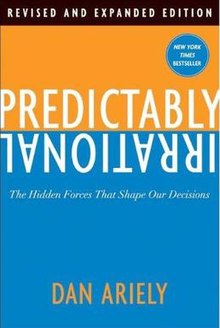Predictably Irrational
 |
|
| Author | Dan Ariely |
|---|---|
| Country | United States |
| Language | English |
| Genre | Behavioral economics |
| Publisher | HarperCollins |
|
Publication date
|
February 2008 |
| Media type |
Print (Hardcover) |
| Pages | 304 |
| ISBN | |
| OCLC | 182521026 |
| 153.8/3 22 | |
| LC Class | BF448 .A75 2008 |
Print (Hardcover)
Predictably Irrational: The Hidden Forces That Shape Our Decisions is a 2008 book by Dan Ariely, in which he challenges readers' assumptions about making decisions based on rational thought. Ariely explains, "My goal, by the end of this book, is to help you fundamentally rethink what makes you and the people around you tick. I hope to lead you there by presenting a wide range of scientific experiments, findings, and anecdotes that are in many cases quite amusing. Once you see how systematic certain mistakes are—how we repeat them again and again—I think you will begin to learn how to avoid some of them".
Ariely discusses many modes of thinking and situations that may skew the traditional rational choice theory. There are 15 chapters in total, and the following outline the main points.
In chapter 1, Ariely describes the ways in which people frequently regard their environment in terms of their relation to others; it is the way that the human brain is wired. People not only compare things, but also compare things that are easily comparable. For example, if given the following options for a honeymoon - Paris (with free breakfast), Rome (with free breakfast), and Rome (no breakfast included), most people would probably choose Rome with the free breakfast. The rationale is that it is easier to compare the two options for Rome than it is to compare Paris and Rome. Ariely also explains the role of the decoy effect (or asymmetric dominance effect) in the decision process. The decoy effect is the phenomenon whereby consumers will tend to have a specific change in preference between two options when also presented with a third option that is asymmetrically dominated. This effect is the "secret agent" in many decisions. In the example with the honeymoon options, Rome without free breakfast is the decoy. (It makes Rome with breakfast look superior to Rome without breakfast. Comparing Rome and Paris is difficult, so the easy comparison of Rome makes it more likely to choose Rome over Paris.) It makes Paris look inferior when compared to Rome with the free breakfast. Relativity helps people make decisions but it can also make them miserable. People compare their lives to those of others, leading to jealousy and inferiority. Ariely finishes the chapter by saying "the more we have, the more we want" and his suggested cure is to break the cycle of relativity. To break the cycle, people can control what goes on around them. The focus on smaller "circles" can boost relative happiness, as can changing this focus from narrow to broad. When considering upgrading a phone, the consumer could think about what else they could buy with the money they would spend on the upgrade.
...
Wikipedia
